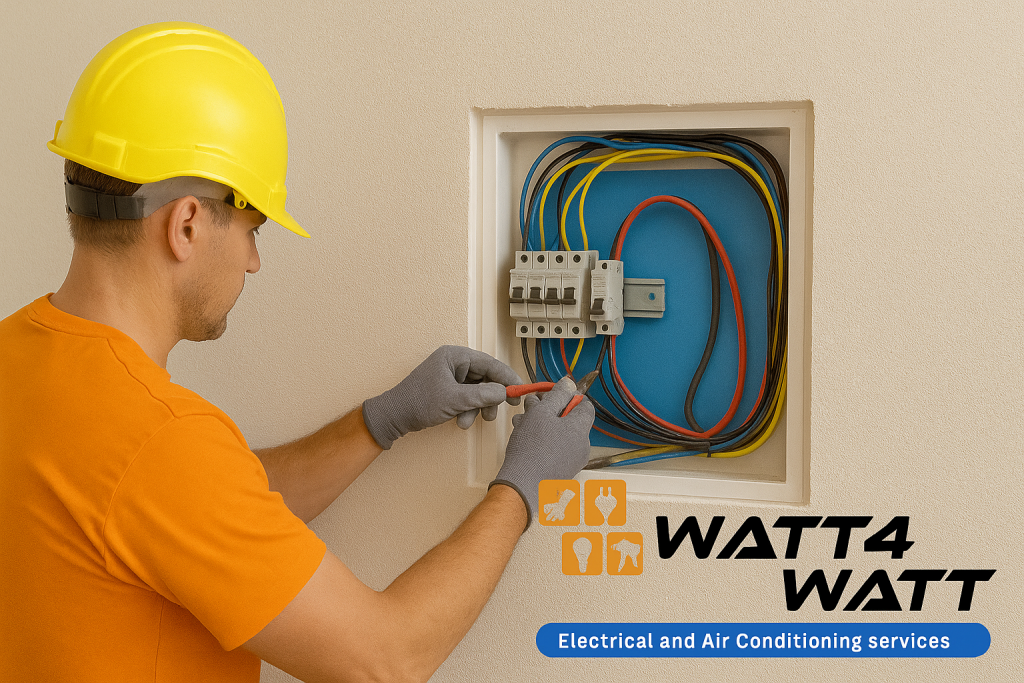
Your home should be a place of comfort and safety. However, hidden electrical faults can put your family and property at risk without warning. Regular electrical safety checks help identify potential hazards, ensure compliance with regulations, and maintain the integrity of your home’s electrical system.
Here’s why scheduling routine electrical inspections is an investment in your family’s safety and your property’s long-term value.
Why Electrical Safety Checks Are Essential
Electrical faults are a leading cause of residential fires and electrical injuries. Over time, wiring can deteriorate, circuits may become overloaded, and previous DIY fixes or outdated systems can lead to undetected hazards.
Regular electrical safety checks help detect:
✅ Faulty wiring
✅ Overloaded circuits
✅ Worn-out or damaged outlets and switches
✅ Potential fire hazards
✅ Non-compliant installations
By catching these issues early, homeowners can avoid emergencies and costly repairs while ensuring peace of mind.
What Happens During an Electrical Safety Check?
A licensed electrician will conduct a thorough inspection, which typically includes:
- Testing power points and light switches for faults or damage.
- Inspecting the switchboard and circuit breakers for compliance and wear.
- Checking the condition of wiring throughout the home.
- Testing smoke alarms for functionality and placement.
- Ensuring earthing and bonding are adequate.
- Identifying overloaded circuits or unsafe connections.
The electrician will provide a detailed report outlining any necessary repairs or upgrades, helping you maintain a safe and efficient home.
Common Issues Identified During Inspections
During routine inspections, electricians often find:
- Frayed or damaged wiring due to age or rodents.
- Outdated fuse boxes that do not comply with current safety standards.
- Overloaded circuits in homes with many high-demand appliances.
- Power points that are loose or have burn marks indicating overheating.
- Improperly installed lighting or DIY electrical work that poses risks.
These issues, if left unaddressed, can lead to electrical fires, shocks, or appliance damage.
How Often Should You Schedule an Electrical Safety Check?
It’s recommended that homeowners have a full electrical safety inspection:
✅ Every 5 years for general safety.
✅ When purchasing a new property to identify hidden electrical issues.
✅ If your home is over 25 years old and hasn’t had recent electrical work.
✅ After major renovations or the addition of high-demand appliances like air conditioners.
Additionally, if you notice flickering lights, frequent circuit breaker trips, buzzing sounds, or burning smells from outlets, an immediate inspection is advised.
Benefits of Regular Electrical Safety Checks
1️⃣ Protect Your Family and Property
Regular inspections significantly reduce the risk of electrical fires and accidents, keeping your loved ones safe.
2️⃣ Save Money in the Long Term
Identifying and fixing small issues early can prevent major repairs, appliance damage, or property loss from fires.
3️⃣ Improve Energy Efficiency
Faulty wiring and outdated systems can waste electricity. Upgrades identified during inspections can help lower energy bills.
4️⃣ Compliance with Regulations
Ensuring your electrical system meets the latest safety standards protects you from potential legal or insurance issues.
5️⃣ Peace of Mind
Knowing your home’s electrical system is safe allows you to focus on enjoying your space without worry.
Who Should Perform Your Electrical Safety Checks?
Electrical safety inspections should only be carried out by licensed and qualified electricians. They have the tools and expertise to identify hazards and ensure your home meets current safety standards. A qualified electrician will also provide clear recommendations if any repairs or upgrades are needed, ensuring your home remains compliant and safe.
Electrical Safety Tips Between Inspections
While professional inspections are essential, homeowners can maintain safety between checks by:
✅ Avoiding overloading power points with multiple devices.
✅ Using only high-quality power boards with surge protection.
✅ Replacing damaged cords and plugs immediately.
✅ Keeping electrical devices away from water.
✅ Testing smoke alarms monthly to ensure functionality.
✅ Avoiding DIY electrical work, which is illegal and dangerous.
Taking these precautions reduces the chances of accidents while maintaining your home’s electrical health.
Electrical safety is not something to overlook. Regular electrical safety checks help protect your family, your home, and your investment by identifying hazards before they turn into emergencies. Whether you live in a newly built home or an older property in Australia, routine inspections should be a part of your home maintenance plan.
By scheduling regular electrical safety checks, you can prevent avoidable dangers, lower your energy costs, and enjoy peace of mind, knowing your home is a safe environment for your family.
If it has been several years since your last inspection, or if you notice any signs of electrical issues, now is the perfect time to book a professional check and ensure your home remains safe for years to come.
